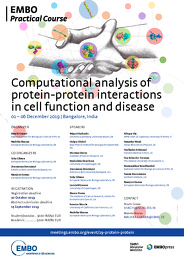About the Practical Course
Understanding how proteins interact with each other is essential for contemporary biomedical research. Continual growth in protein-protein interaction (PPI), protein complex and network data have created new opportunities to exploit these resources bioinformatically and link them to cell function as well as disease and therapeutics. Many tools exist to analyse and disseminate these data but most bench scientists are not trained to use them.
This course aims to equip researchers with the computational skills crucial for carrying out in-depth analyses of PPI by exploring, managing, and interconnecting their datasets. Trainees will learn about the current developments in the field through plenary talks and lectures. Practical sessions will focus on bioinformatics tools such as STRING, Cytoscape, Chimera, ELM and IUPRED, guided by experts who are the developers of these tools. Many of the publicly available tools are highly interconnected and we will show participants how to take advantage of this integration.
Ideal participants for this course are bench scientists who are working to obtain data related to PPIs, or already have such data they want to analyse. One of the focuses of this Practical Course will be teaching the importance of PPIs in biological systems, and how bioinformatics tools can be harnessed for understanding the physiological states and when these states are perturbed by disease. Keeping these aspects into consideration, publicly available experimental datasets of disease relevance (e.g. viral interactomes) are integrated into the training materials.
This workshop has been offered with different focuses since 2014, through which we have pioneered training in bioinformatics tools associated with the diversity and importance of PPIs involving various protein modules. From this course, participants will gain skills to analyse, manage, interconnect small and large PPI data, and design effective bio-computational experiments. The overall impact of the course is enhanced by giving the trainees opportunities to analyse public data in the presence of expert trainers, helping them acquire skills to investigate globular and intrinsically disordered polypeptide regions (IDRs) and gain biological insights in their own datasets.
About EMBO Courses and Workshops
EMBO Courses and Workshops are selected for their excellent scientific quality and timelines, provision of good networking activities for all participants and speaker gender diversity (at least 40% of speakers must be from the underrepresented gender).
Organisers are encouraged to implement measures to make the meeting environmentally more sustainable.




